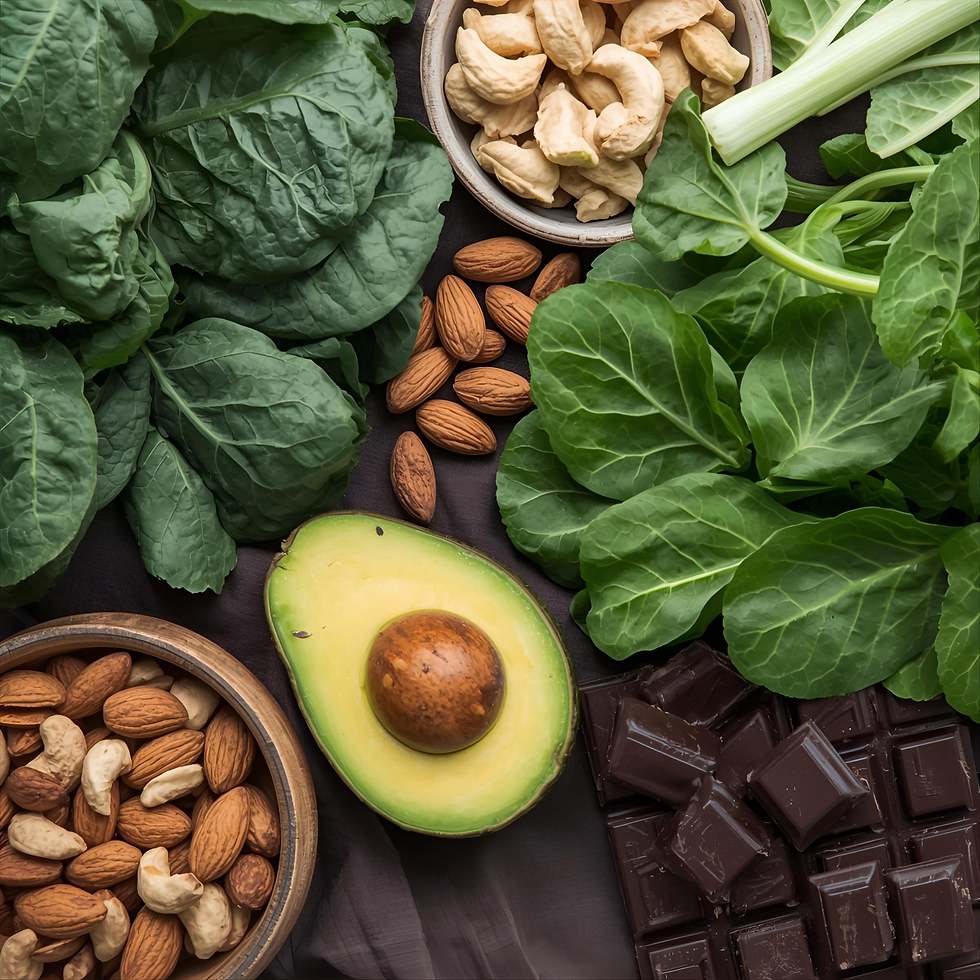Supporting your Thyroid with Nutrition and Lifestyle
- Emma Hammond

- Aug 13
- 4 min read
Updated: Sep 13
Your thyroid is a small, butterfly-shaped gland with an outsized job: it sets the pace for your metabolism, temperature control, energy, mood, and even hair and skin health. When it’s under pressure, two common culprits, nutrient deficiencies and chronic stress, can often make things worse.

Why nutrients matter so much
Thyroid hormones (T4 and T3) are made, converted, and used with the help of specific vitamins, minerals, and proteins. Even mild shortfalls can nudge the system off course.
Iodine — the raw material
Role: Essential building block for T4 and T3.
Too little: Can reduce hormone production (hypothyroidism).
Too much: Can irritate a sensitive thyroid or trigger swings.
Food sources (UK): Iodised salt (check the label; not all UK table salt is iodised), milk and yoghurt, white fish (cod, haddock), eggs.
Tip: Don’t self-prescribe high-dose kelp/iodine supplements unless advised by a clinician, especially if you have thyroid autoimmunity.
Selenium — the converter and protector
Role: Helps convert T4 → T3 and protects the gland from oxidative stress.
Low levels: May impair conversion and raise “reverse T3”, leaving you sluggish.
Food sources: Brazil nuts (1–2 nuts can meet daily needs), tuna, sardines, eggs, mushrooms, whole grains.
Zinc — the signal booster
Role: Supports TSH signalling, T4 → T3 conversion, and immune balance.
Food sources: Shellfish (oysters), red meat, pumpkin seeds, chickpeas, cheese, whole grains.
Iron — the oxygen carrier and enzyme helper
Role: Needed for thyroid peroxidase (TPO), the enzyme that makes thyroid hormone.
Low ferritin: Common in heavy periods or low-iron diets; can mimic or worsen hypothyroid symptoms.
Food sources: Red meat, liver, beans, lentils, spinach; pair plant sources with vitamin C (e.g., peppers) to boost absorption.
Vitamin D — the immune modulator
Role: Helps keep immune responses in check; low levels are common in the UK winter and may relate to autoimmune thyroiditis.
Sources: Sunlight (spring–summer), oily fish, fortified foods; consider a daily supplement in autumn/winter per UK guidance.
B12 & Folate — the energy team
Role: Support energy metabolism and nervous system function; low B12 is common in restrictive diets or pernicious anaemia.
Sources: Meat, dairy, eggs; fortified plant milks and nutritional yeast for plant-based eaters; leafy greens for folate.
Tyrosine & Protein — the backbone
Role: Tyrosine (from protein) couples with iodine to form thyroid hormones.
Sources: Poultry, fish, dairy, soy, legumes, nuts and seeds.
Medication note: Calcium, iron, and some fibre supplements can reduce absorption of levothyroxine. If you’re on thyroid medication, take it on an empty stomach and leave a 4-hour gap before/after these supplements unless your clinician advises otherwise.
How stress unsettles the thyroid
Short bursts of stress are fine; it’s chronic stress that causes trouble. Here’s how:
Cortisol competes with conversion: Prolonged high cortisol can down-shift T4 → T3 and increase reverse T3 (an inactive form), leaving you tired, cold, and foggy.
Immune mischief: Stress can fan the flames of autoimmunity (e.g., Hashimoto’s, Graves’), aggravating symptoms.
Sleep disruption: Poor sleep raises cortisol and inflammatory messengers, compounding the problem.
Lifestyle knock-ons: Stress nudges us towards skipped meals, low-protein snacks, excess caffeine/alcohol, and reduced movement — all unhelpful for thyroid balance.
Spotting the signs (quick checklist)
Possible low thyroid (hypothyroid): Fatigue, feeling cold, weight gain, constipation, dry skin, hair thinning, heavy/irregular periods, low mood, brain fog.
Possible overactive thyroid (hyperthyroid): Anxiety, palpitations, heat intolerance, weight loss despite good appetite, tremor, frequent bowel movements, lighter periods, trouble sleeping.
These often overlap with other conditions — testing is the only way to know.
What to test
TSH, Free T4
Free T3
Thyroid antibodies (TPOAb, TGOAb) to check for autoimmunity.
Iron (including ferritin), vitamin D, B12, folate, and consider zinc/selenium if the diet is limited.
Practical nutrition steps
Build a thyroid-smart plate:
¼ plate protein (fish, chicken, eggs, tofu/tempeh, beans).
½ plate colourful veg (including some sea-veg occasionally if advised).
¼ plate whole grains or starchy veg (oats, brown rice, potatoes).
Add healthy fats (olive oil, nuts, seeds).
Prioritise key foods each week:
2 portions oily fish (salmon, mackerel) for selenium and vitamin D.
Dairy or fortified alternatives for iodine (check the label for iodine and B12 fortification).
Pulses and leafy greens for iron and folate.
A few Brazil nuts for selenium (1–2 most days is plenty).
Be supplement-smart:
Consider a vitamin D supplement in autumn/winter.
Iron or B12 only if deficient or advised — don’t guess.
Avoid high-dose iodine without medical guidance, especially with thyroid antibodies.
Stress management that actually helps
Sleep like it matters: Aim for 7–9 hours; keep caffeine to the morning; a dark, cool bedroom; regular bedtimes.
Breathe & move: 10 minutes/day of slow breathing, yoga, or a brisk walk can lower cortisol.
Strength training 2–3×/week: Supports metabolism and mood without over-taxing your system.
Set boundaries on stimulants: Cap coffee/energy drinks and alcohol; both can worsen sleep and jitters.
Make recovery non-negotiable: If you exercise hard, build in easy days.
Simple meal ideas
Breakfast: Greek yoghurt (or fortified soy yoghurt) with oats, berries, and a sprinkle of pumpkin seeds.
Lunch: Tuna and bean salad with olive oil, lemon, and mixed leaves; wholemeal pitta on the side.
Dinner: Baked cod with new potatoes and steamed broccoli; drizzle with tahini-lemon sauce.
Snack: 1–2 Brazil nuts and an apple; or hummus with carrot sticks.
Bottom line
For many people, gently correcting nutrient gaps and taming chronic stress can make a meaningful difference to thyroid health — and how you feel day to day. Start with food, sleep, movement, and layer in targeted supplements when needed.
A simple blood test to check your thyroid hormone levels can quickly confirm whether your thyroid is functioning as it should.
I can recommend a blood test for a full thyroid blood panel, including antibodies (to check for Hashimoto's autoimmune disease) in clinic. Book a Discovery call today, via the website, to find out more



